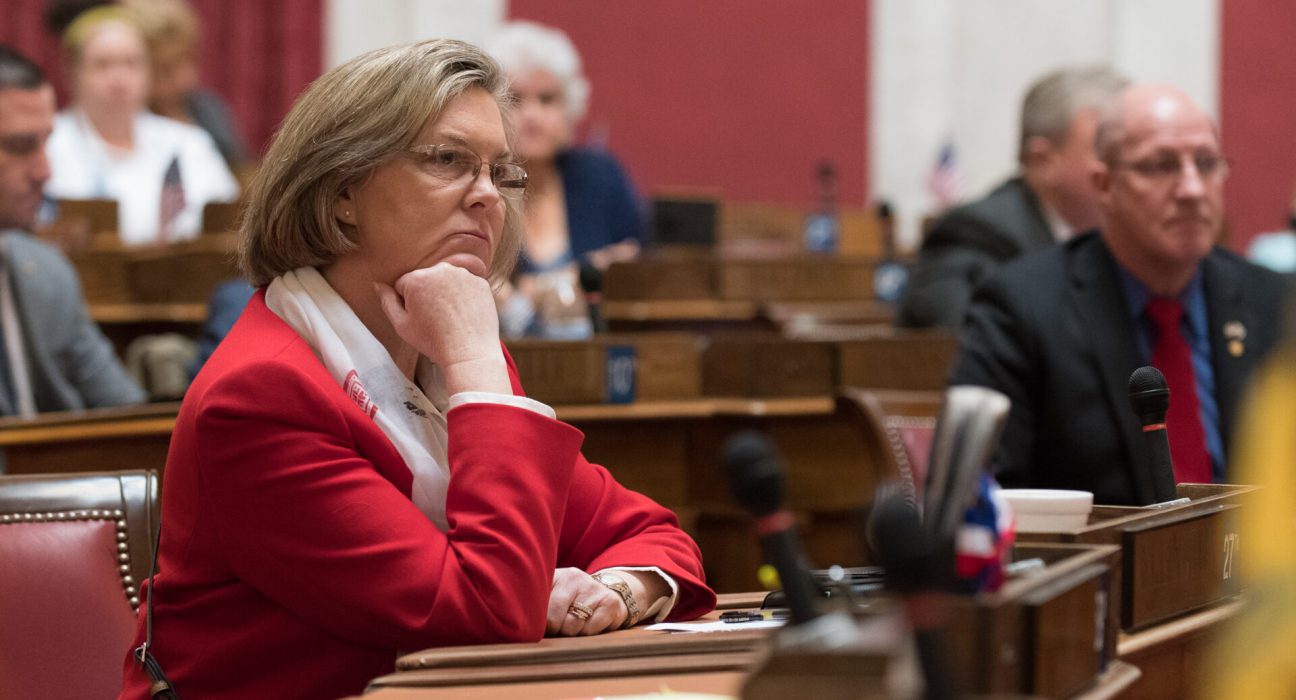The West Virginia House of Delegates refused to concur with the state Senate’s amendment to Senate Bill 1001 in a late-night session Monday.
Senate Bill 1001 and its counterpart, House Bill 101, aim to restore funding to the Department of Health and the Department of Human Services, focused on the state’s Medicaid and Title IX waiver programs.
Clawback Cuts
According to the West Virginia Center on Budget and Policy, the Fiscal Year 2025 budget the legislature passed earlier this year underfunded the state’s Medicaid program by about $150 million.
This included a more than $10 million decrease in the line item in the state’s budget for the intellectual and developmental disabilities waivers, commonly called IDD waivers program.
The program allows people with disabilities to live outside hospitals and institutions by connecting them with resources like home health care workers and financial support.
In response to the cuts, advocates and providers alike have been sounding the alarm after the budget was passed in March.
Gov. Jim Justice said during a press briefing April 17 that he is not to blame for the budget cuts and said he would check and see if there was any way that it could be funded, without bloating the budget.
Lawmakers said the budget cuts were necessary due to a possible federal government clawback of $465 million in COVID-19 relief funding for schools.
Justice announced in April that West Virginia will not face that clawback.
Pressing Costs
Lawmakers said they did not think they could trust the secretaries of the Department of Health and the Department of Human Services to spend the money accordingly, without the line items.
These concerns stem from a line of questioning during an interim meeting in April where Human Services Secretary Cynthia Persily testified that the department used funds from the IDD waiver program to pay for contract nurses and COVID-19 testing.
Before and during the pandemic, Persily testified that the previous Department of Health and Human Resources (DHHR) administration would use leftover funds to fund what she called “pressing costs.” According to Persily, this was common practice in the department before it was split into three separate departments by an act of the legislature last year.
Lawmakers and Justice now agree, the funding must be restored. Senate Bill 1001 allocates more than $5 million to the Department of Health and $183,437,463 to the Department of Human Services.
These monies would be placed in reserve funds that can be accessed by the agency secretaries when or if the money is needed. However, each chamber wants its own form of oversight over how these additional funds are spent.
An Extraordinary Session
Del. Amy Summers, R-Taylor, amended the bill in the House Finance Committee to require increasing reimbursement rates for companies and their employees providing services for people with disabilities.
“We all know that if we don’t have the workers to take care of individuals in these settings then we will take care of these individuals in state psych hospitals,” Summers said in committee Monday.
The House sent that version over to the Senate where Summers’ amendment was stripped and the Senate reverted it to their plans – Sen. Eric Tarr’s, R-Putnam, original amendment.
“That reserve fund is there so that the quarterly disbursements, if they aren’t enough for any given line that has been cut, they can make a transfer, but the Secretary has to sign off on it,” Tarr told West Virginia Public Broadcasting. “She has to report on the transfers monthly to the joint committee.”
Tarr’s amendment also includes language that requires the unexpended reserve funds be returned to the Treasury by March 31, 2025.
House language to prohibit any funds from being transferred out of the home and community based waiver programs was retained in this version.
When the bill arrived back in the House, delegates from both sides of the aisle expressed outrage at the Senate’s actions.
“So let me get this straight,” Summers said. “Our bill went over, where we had the rates in there, the rate increases for IDD, for TBI, for aged and disabled waiver, for personal care services that went over there. They didn’t like that. But then they made sure they stuck in the amendment that they wanted about, ‘We want all this money to expire to general revenue on March 31.’ And now we’re supposed to take that?”
Del. Michael Hite, R-Berkeley, said the House’s amendments were meant to restore money and direct it to specific funds and services.
“Not just to leave it up to the Department of Human Services, again, to do the right thing,” Hite said. “That was the purpose of our amendments. That’s what we voted on in here. To make sure that they did the right thing, because they have proven over and over again that they don’t do the right thing.”
Del. Joey Garcia, D-Marion, said this was the time to fight, and encouraged his fellow lawmakers to reject the Senate’s amendments.
“The lady from the 73rd, offered a great amendment,” Garcia said. “And I talked to somebody from the Senate here a second ago and asked, and they said, ‘Well, that should be up to the discretion of the secretary, whether or not they have the ability to do these provider rate increases, right?’ Well, they haven’t done it. We as a body have the ability to set that policy and say, ‘Yes, you will take that money, and you will fund those, because otherwise, what are we doing here, but trying to find an illusory solution?”
Del. Mark Zatezalo, R-Hancock, said it is the lawmaker’s responsibility to keep promises to their constituents, and by rejecting the Senate’s amendments, they’d be keeping their promises.
“I agree with my colleagues here, we need to stick with our position on this and make sure it gets to where it goes so that we basically are telling people the truth,” Zatezalo said.
Del. Eric Householder, R-Berkeley, disagreed with his colleagues. He said Senate Bill 1001 fulfilled their promise to the people of West Virginia, and lawmakers were putting that at risk.
“I can’t give you any guarantees, whether or not they’re going to recede or not,” Householder said. “You’re gonna put that at risk by having a conference committee, that it’s an unknown. I’m saying that if this bill restores the cuts, we’re better off to concur with the Senate amendment and move on.”
The House voted nearly unanimously to reject the Senate’s amendment and refused to concur, requesting the Senate to recede.







